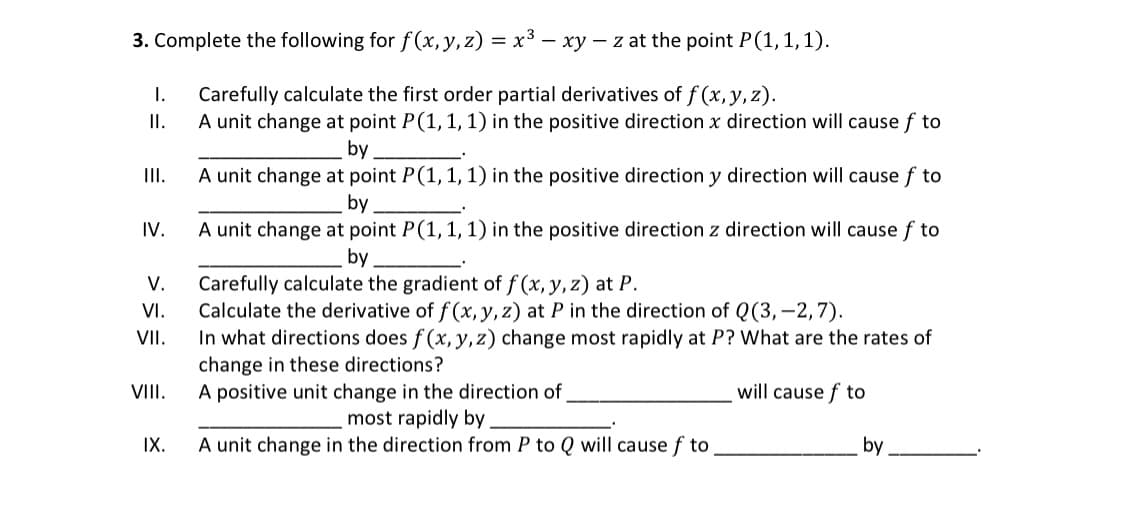3. Complete the following for f(x, y, z) = x³ - xyz at the point P(1, 1, 1). Carefully calculate the first order partial derivatives of f(x, y, z). A unit change at point P(1, 1, 1) in the positive direction x direction will cause f to by A unit change at point P(1, 1, 1) in the positive direction y direction will cause of to by - A unit change at point P(1, 1, 1) in the positive direction z direction will cause f to by I. II. III. IV. V. VI. VII. VIII. IX. Carefully calculate the gradient of f(x, y, z) at P. Calculate the derivative of f(x, y, z) at P in the direction of Q(3,-2,7). In what directions does f(x, y, z) change most rapidly at P? What are the rates of change in these directions? A positive unit change in the direction of will cause fto most rapidly by A unit change in the direction from P to Q will cause f to by
3. Complete the following for f(x, y, z) = x³ - xyz at the point P(1, 1, 1). Carefully calculate the first order partial derivatives of f(x, y, z). A unit change at point P(1, 1, 1) in the positive direction x direction will cause f to by A unit change at point P(1, 1, 1) in the positive direction y direction will cause of to by - A unit change at point P(1, 1, 1) in the positive direction z direction will cause f to by I. II. III. IV. V. VI. VII. VIII. IX. Carefully calculate the gradient of f(x, y, z) at P. Calculate the derivative of f(x, y, z) at P in the direction of Q(3,-2,7). In what directions does f(x, y, z) change most rapidly at P? What are the rates of change in these directions? A positive unit change in the direction of will cause fto most rapidly by A unit change in the direction from P to Q will cause f to by
Advanced Engineering Mathematics
10th Edition
ISBN:9780470458365
Author:Erwin Kreyszig
Publisher:Erwin Kreyszig
Chapter2: Second-order Linear Odes
Section: Chapter Questions
Problem 1RQ
Related questions
Question
Just 5-9 please

Transcribed Image Text:3. Complete the following for f(x, y, z) = x³ - xy - z at the point P(1, 1, 1).
Carefully calculate the first order partial derivatives of f(x, y, z).
A unit change at point P(1, 1, 1) in the positive direction x direction will cause f to
I.
II.
III.
IV.
V.
VI.
VII.
VIII.
IX.
by
A unit change at point P(1, 1, 1) in the positive direction y direction will cause f to
by
A unit change at point P(1, 1, 1) in the positive direction z direction will cause f to
by
Carefully calculate the gradient of f(x, y, z) at P.
Calculate the derivative of f(x, y, z) at P in the direction of Q (3,-2,7).
In what directions does f(x, y, z) change most rapidly at P? What are the rates of
change in these directions?
A positive unit change in the direction of
will cause of to
most rapidly by
A unit change in the direction from P to Q will cause f to
by
Expert Solution
This question has been solved!
Explore an expertly crafted, step-by-step solution for a thorough understanding of key concepts.
Step by step
Solved in 2 steps

Recommended textbooks for you

Advanced Engineering Mathematics
Advanced Math
ISBN:
9780470458365
Author:
Erwin Kreyszig
Publisher:
Wiley, John & Sons, Incorporated

Numerical Methods for Engineers
Advanced Math
ISBN:
9780073397924
Author:
Steven C. Chapra Dr., Raymond P. Canale
Publisher:
McGraw-Hill Education

Introductory Mathematics for Engineering Applicat…
Advanced Math
ISBN:
9781118141809
Author:
Nathan Klingbeil
Publisher:
WILEY

Advanced Engineering Mathematics
Advanced Math
ISBN:
9780470458365
Author:
Erwin Kreyszig
Publisher:
Wiley, John & Sons, Incorporated

Numerical Methods for Engineers
Advanced Math
ISBN:
9780073397924
Author:
Steven C. Chapra Dr., Raymond P. Canale
Publisher:
McGraw-Hill Education

Introductory Mathematics for Engineering Applicat…
Advanced Math
ISBN:
9781118141809
Author:
Nathan Klingbeil
Publisher:
WILEY

Mathematics For Machine Technology
Advanced Math
ISBN:
9781337798310
Author:
Peterson, John.
Publisher:
Cengage Learning,

